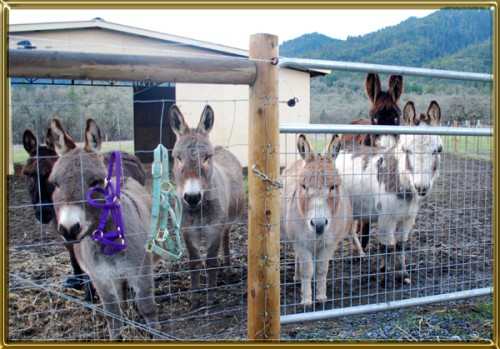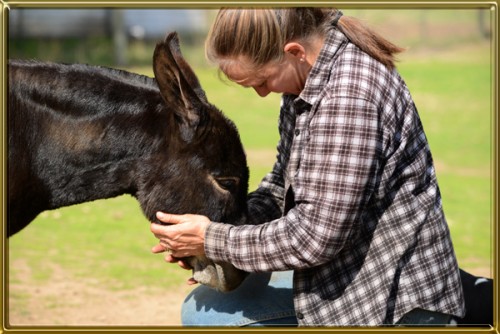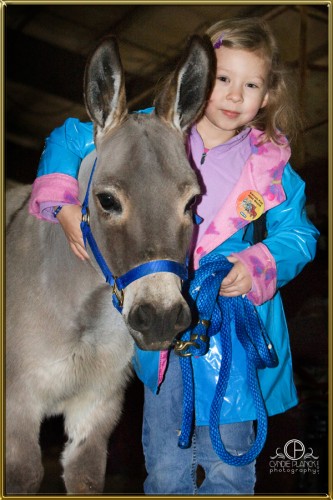written by
Cindy Benson 2016
A mature jack is a hyper-vigilant, territorial, and somewhat feral animal when compared to a stallion. Setting him up in an emotionally enriching environment will increase the quality of his life, and make him easier to handle. Jacks can be such a joy. My jacks have always been my favorites. They test boundaries and keep me on my toes, but they are honest and straightforward about it and if I am willing to see the world thorough their eyes it makes all the difference. Starting out with a young jack represents such an opportunity.
Jacks have a lot of energy and are “on” all the time. They are often housed alone when they aren’t being used for breeding, or just in general, and that doesn’t give them much of an outlet for this energy. They are also very physical in how they interact with other donkeys. Jennets seldom appreciate this! I prefer to partner my young jacks with a gelding as a companion. I do this when they both are weanlings and select a gelding that will be larger than the jack at maturity just to give the gelding a little edge, size-wise. This provides the jack a partner for life. Every once in awhile there will be a jack who gets too rough with his gelding friend as he matures and they need to be separated, but most of the time this works just fine. It is very rewarding to watch a jack romp and play with a friend as jennets and geldings are allowed to do. There is definitely a window of opportunity to set this up. If you give a mature jack a gelding to play with he is likely to see him as a rival rather than a potential friend and may abuse him so the key is starting when the jack is young.
Once the young jack and his gelding friend are weaned I like them to live with bred jennets if possible for at least several months. Jacks need to know where they stand in the social hierarchy. I seldom pasture breed so most of my jacks don’t need to know how to do that but I do want them to learn to be respectful and gentle with my jennets. A group of girls will teach a young jack that he’d better be cautious around them. Handling a young jack for breeding can be challenging but I think the situation goes more smoothly if the jack knows how to behave around jennets to begin with.
My donkeys get a lot of training, especially my jacks. I start halter training my foals by the time they are a month old or so because that is when I begin trimming their hooves. Once the foals are weaned I bring them up to live in the main barn for a week or two so that I can do more advanced schooling. I think it is important for a jack to completely understand how to be respectful at the end of a lead rope. I take mine for walks and tie them at various places on the ranch so that they don’t always know what to expect from me. If a jack is haltered and led only for breeding that is a real set up for him because he is likely to be excited and distracted when he sees that halter rather than gentle and attentive. I feed my donkeys out of a Kubota RTV and drive in and out of the fields to do this. I often tie a young jack off the side and drive him around the ranch with me as I do chores. This is such a good education for them!
I breed my jacks in their own pens, only. I remove the gelding friend and then bring the jennet to the jack. There are many reasons I do it this way but one of the big ones is that my jacks learn that no matter where else they are on the ranch, or at shows, parades, etc., they are not going to be breeding jennets out and about. They learn to relax and enjoy themselves. When I drive in and out of the fields the jacks let me know which jennets are in season but since they know they aren’t out there for breeding they don’t get overly excited.
Jacks are fun! They are gorgeous and powerful and allow me a different relationship with them than I have with my jennets or geldings. Correct early training makes all the difference. Re-training a mature jack can be done, but it is so much easier on the jack and his owner if things are done right in the first place.

There is two year old jack hiding in this group of geldings. He’s a fortunate boy to be able to live this way!

